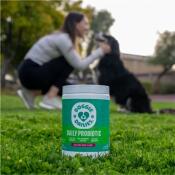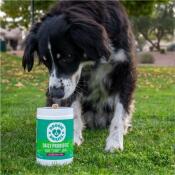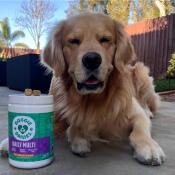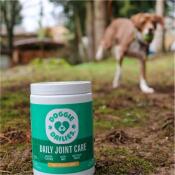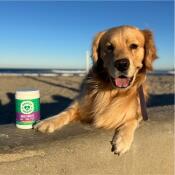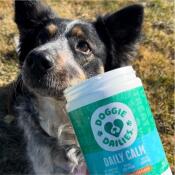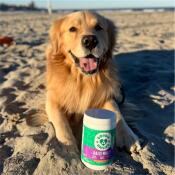Loaded with omega fatty acids, fish oil is one of the best supplements to add to your dog’s diet. Fish oil for dogs often contain oils from multiple species of cold-water fish, such as mackerel, salmon, sardines, and anchovies to name a few. It is incredibly important for supporting your dog’s everyday health.
Like humans, dogs can’t make these essential fatty acids internally. Therefore, they must come from food. One of the best sources for omega fatty acids is wild-caught salmon, which has a high concentration of omega fatty acids and has a favorable omega-3 to omega-6 ratio.
When taken regularly, salmon oil for dogs can play a crucial role in supporting a healthy heart and coat while improving joint, skin, and immune system health.
While you should always consult your veterinarian before adding new supplements to your dog's diet, there is some useful information you should know about salmon oil and what it can do for your pet's health and happiness.
Why Fish Oil for Dogs Is Critical for A Healthy Dog Diet
-
Why Are Omega Fatty Acids Important for Dogs?
Salmon oil contains large amounts of omega-3 and omega-6 fatty acids. Of course, fat has earned a poor reputation in the human world, so why would you want to give it to your dog?
In reality, there are four types of fat: trans fats, saturated fats, monounsaturated fats, and polyunsaturated fats. Omega fatty acids exist within polyunsaturated fats and, when digested, they help the body produce hormones that regulate inflammation and blood flow.
The reason why supplementing your dog's diet with omega fatty acids is so important is that the body can't produce them on its own. Omega-3 supplements are often called salmon oil supplements because cold-water fish, like salmon, are primary dietary sources of omega fatty acids for both dogs and humans. While humans may get their omegas from plant oils, nut oils, and flaxseed, your dog can't digest many of those things.
-
Types of Omega Fatty Acids
Just as not all fat types are equal as there are different types of omega-3 fatty acids. The two most important kinds for your dog are EPA and DHA.
-
EPA
Eicosapentaenoic acid, or EPA, plays a critical role in many physiological functions, including reducing inflammation within the body. Inflammation has links to almost every type of disease, including joint problems and heart disease. Of all cold-water fish, salmon contains one of the highest concentrations of EPA.
-
DHA
Docosahexaenoic acid, or DHA, is critical to skin and eye health. In humans, we often fortify infant formula with DHA because it's that essential. When taken regularly, DHA can improve mental sharpness and help ward off various conditions, including heart problems, certain cancers, and joint issues — including canine arthritis. So, supplementing your dog's diet with DHA will keep them healthier all the way around.
-
How to Supplement with Salmon Oil
Depending on the concentration, every product will present a label to help you estimate how much of the supplement your dog requires, usually based on their weight. In general, the suggested dose for salmon oil ranges from 75 mg up to 100 mg for each kilogram (2.2 lbs) of body weight.
Giving too much salmon oil to your dog may cause an upset stomach and lead to "fishy" breath. If you have questions, you can always consult your vet regarding how often you should supplement your dog and for how long. A professional can guide you on the ideal dosage and the best meal plans to boost the effects of salmon oil.
-
The Benefits of Salmon Oil Supplement
The benefits of salmon oil supplementation are plentiful. For many dogs, regular supplementation leads to a noticeable change in their health due to its ability to help with the following.
-
Balances Other Fats
Most dog foods contain meat from corn-fed animals along with sources of refined oil, both of which are high in omega-6. Omega-3 fatty acids play a crucial role in balancing out the omega-6 fatty acids, which is important because your dog needs both.
-
Supports Healthy Development
For puppies, in particular, a salmon oil supplement supports healthy brain and eye development. It can also aid and prevent cognitive disfunction in older dogs.
-
Promotes A Healthy Heart
The omega fatty acids in salmon oil have incredible cardioprotective benefits. They combat abnormal heart rhythms, and help to regulate inflammation and blood circulation.
-
Improves Skin & Coat Health
Fish oil improves skin and coat health, reducing itchy and flaky skin and encouraging a shinier, silkier coat. Not only will your dog look better, they'll feel better, too!
-
Acts As An Anti-Inflammatory
Regular supplementation supports heart health and overall wellness with the help of anti-inflammatory properties. Those same properties support healthy joints and prevent arthritis while reducing the risk of internal inflammatory diseases, like chronic kidney disease.
-
Immune-Boosting Properties
Salmon oil can help relieve allergies by strengthening the skin to provide a barrier against allergens while promoting a stronger immune system.
-
Reduces The Risk of Cancer
Maintaining healthy supplementation of DHA and EPA in your dog's diet will reduce the risk of canine cancer, according to the American Kennel Club.
-
-
What to Look for in Your Dog's Salmon Oil Supplement
Whenever you're looking to add something new to your dog's diet, be it a supplement, treat, or different food type, it's crucial that you do your research. You want to feel confident that your dog is getting a product that's good for them and for the world at large.
When it comes to choosing a salmon oil supplement, it is important to always look for products that contain wild-caught and sustainably sourced salmon.
Wild-caught salmon is far superior to farm raised salmon. Farmed salmon have a completely different diet and environment than wild salmon. Because of its natural diet and environment, wild-caught salmon not only has a more ideal omega-3 to omega-6 ratio, but it also is higher in minerals, like potassium, zinc and iron.
Additionally, farm raised salmon have higher concentrations of antibiotics and harmful contaminants, like polychlorinated biphenyls and several chlorinated pesticides.
As for sustainability, look for a manufacturer that sources its salmon oil under the guidelines presented by the Marine Stewardship Council. For twenty years, the MSC has devoted itself to upholding exacting standards to ensure sustainable fishing practices. They continue to help guide the production of sustainable salmon oil supplements for people and their precious pets.
While it may take a little research, once you find the perfect salmon oil for dogs, you'll be able to feed them with confidence by knowing that they're getting the essential fatty acids they need for a healthier lifestyle.

